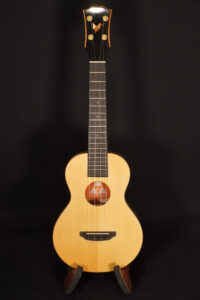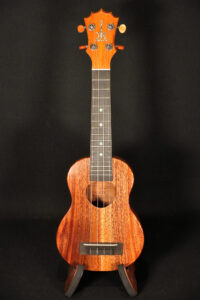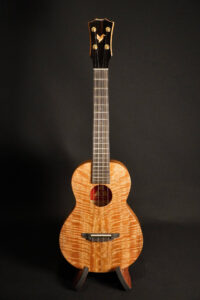Buy ukulele guide
Alongside the guitar, the ukulele is one of the most popular stringed instruments in the world today and offers both beginners and advanced players countless possibilities, great sound experiences and lots of fun!
We at Munich Guitar Company specialize in ukuleles in addition to acoustic guitars and are one of the few dealers in Germany to offer a hand-picked and international selection of great ukuleles at any time, ranging from high-quality beginner instruments to high-quality professional instruments and rare one-offs.
Every instrument we offer is carefully checked and professionally adjusted in our in-house Professional luthier with over 30 years of experience.
Here you can find our selection of available ukuleles:
https://guitars.de/produkt-kategorie/ukulele/
Buying a ukulele as a beginner – What to consider? Which size is the right one?
When buying a ukulele for beginners, you should pay attention to a minimum level of quality if possible.
Properly crafted instruments made from high-quality materials sound better, are more durable and are simply easier and more pleasant to play.
This makes learning more fun, motivates and makes practicing easier.
For a beautiful and round sound, a ukulele should at least have a solid Top and generally be properly finished. Solidly built instruments sound even better, of course, but they usually cost a little more.
For the longevity and comfortable playability of the ukulele, the instrument should be optimally adjusted (comfortable string action) and have high-quality components such as frets and tuners.
Because we know from experience what is important when it comes to the quality of an instrument, we can always give you professional and competent advice when looking for the right ukulele.
Our team is looking forward to your visit and your inquiry!
When it comes to the size of the ukulele, we don’t think there is one that is more suitable for beginners than the other.
The choice between a soprano ukulele, concert ukulele or tenor ukulele depends on the desired sound character. The larger the design, the louder, warmer and fuller the sound of the ukulele will be. The smaller the design, the more treble and “brighter”.
The scale length also varies with the size of the ukulele. The smaller the ukulele, the shorter the scale length. The larger the ukulele, the larger or longer the scale length.
Depending on the size of your hand, a shorter scale length may be more comfortable to grip or a longer one.
We will also be happy to advise you on this!
Ukuleles for advanced and professional players
We also have a great selection of instruments in stock for advanced ukulele players and professionals at all times.
Here you will find great, handmade and of course solidly built ukuleles from manufacturers such as AnueNue, Da Silva, Kiwaya, Oli, Rebel, Seilen, Koaloha and many more.
When choosing the right high-quality instrument, it naturally depends on the desired sound and the area of application.
Each instrument sounds different and unique, depending on the combination of design, construction, size and wood quality.
The following applies here: If possible, you should definitely take the time to compare different ukuleles directly on site in order to make the right choice in the end.
We would also be happy to make you a custom ukulele according to your personal wishes and ideas. Simply contact us via our contact form in the custom and new build section:
https://guitars.de/stevens-custom-shop/ukulele-stevens/
High-quality ukuleles are generally characterized by excellent workmanship, solid and good wood quality, high-quality components such as tuners and an optimal setup. The result is a great-sounding and durable instrument that is optimally adjusted to the ukulele player and their individual needs.
Ukuleles – What are the differences? – Sizes, design, special features
Ukuleles are available in a wide variety of shapes, sizes and designs.
However, the most common ukulele sizes are the soprano ukulele, the concert ukulele and the tenor ukulele.
The soprano ukulele is the smallest of the known ukulele sizes. It has a small body, a comparatively short scale length of 28 cm and is characterized by a rather high-pitched, more brilliant and clearer sound.
There are also smaller designs such as the soprano ukulele, but these are less common.
The next largest ukulele after the soprano size is the concert ukulele.
It has a slightly longer scale length of around 38cm to 39cm and sounds warmer, fuller and louder, which is due to the larger body.
This is immediately followed by the tenor ukulele, again with a longer scale length of around 43 cm, an even larger body and a correspondingly more voluminous sound.
The sound of a tenor ukulele can sometimes be compared to the sound of a very small Classical Guitar.
In addition to the soprano, concert and tenor sizes, there are of course many other sizes of ukulele.
Baritone ukuleles are even larger than the tenor size and are tuned lower than normal ukuleles.
Bass ukuleles don’t have much in common with a normal ukulele apart from their small size compared to other basses. They are tuned like a normal bass and have different strings.
Our own further development of the ukulele bass, for example, is strung with specially made steel strings and has already helped us gain international recognition in the professional sector.
Ukulele – Tuning and stringing
The standard tuning for most ukuleles is G,C,E,A.
String sets for ukuleles usually contain a high G string, but this can also be replaced with a so-called lower “low G” string. This changes the sound character of the ukulele and makes it sound deeper, fuller and warmer.
There are also differences in the materials used for ukulele strings. There is no right or wrong here and the ideal choice of strings depends on the desired sound and the sound character of the instrument. We will be happy to advise you on this.
Ukulele – pickups and designs
As a rule, most ukuleles are delivered from the factory purely acoustic and without a built-in pickup. However, there are of course also some models where the pickup is already built in. Of course we have both variants in stock.
Most pickups for ukuleles are a so-called piezoelectric pickup that is installed under the bridge of the ukulele and thus amplifies and picks up the vibrations of the instrument.
Particularly high-quality systems also have a small microphone installed alongside the piezo. This means that both signals, which each offer a different sound image, can either be selected individually or mixed together.
Most pickups for ukuleles are also active and are powered by a built-in battery, a rechargeable battery or a capacitor. However, there are also purely passive pickup systems for ukuleles.
Depending on the desired sound, instrument or area of application, certain pickups for ukuleles may be more suitable than others.
We therefore recommend, if possible, selecting the right pickup for your instrument individually and having it professionally fitted.
Every year we install hundreds of pickup systems in a wide variety of instruments and always have a large selection of different pickups in stock.
Our favorites include systems from K&K and MISI, for example.
We will be happy to advise you on choosing the right pickup for your ukulele.
Simply contact us via our workshop contact form:
https://guitars.de/werkstatt-reparaturen/
Ukulele – history and origin
The ukulele originated in Portugal and then found its way to Hawaii in the 19th century. From there, it later spread to America and then worldwide.
Ukulele – Woods
As with guitars, a wide variety of woods and wood combinations are used to make ukuleles. The combination of wood type, wood quality, construction and design ultimately creates the unique sound character of each instrument.
No two pieces of wood are the same and therefore no two ukuleles sound the same and unique.
In addition to “more common” types of wood such as spruce, mahogany or cedar, exotic woods such as koa, rosewood or mango are often used in the construction of ukuleles.
These exotic types of wood are not only characterized by a special sound, but often also by a beautiful visual grain that enhances the appearance of the instrument.
Choosing the right wood for your ukulele is like choosing the right size or shape: there is no right or wrong, it all depends on your individual taste. Therefore, if possible, you should always take the time to compare different types of wood. In the end, it’s your own ear that decides what suits you best.




